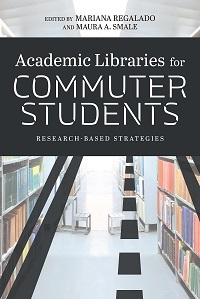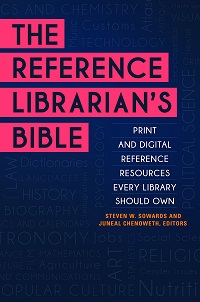Libraries for Commuter Students, Cataloging Tips, Reputable Reference | Pro Media Reviews
 Academic Libraries for Commuter Students: Research-Based Strategies. ALA. Jun. 2018. 163p. ed. by Mariana Regalado & Maura A. Smale. notes. bibliog. index. ISBN 9780838917015. pap. $59.99. PRO MEDIA
Academic Libraries for Commuter Students: Research-Based Strategies. ALA. Jun. 2018. 163p. ed. by Mariana Regalado & Maura A. Smale. notes. bibliog. index. ISBN 9780838917015. pap. $59.99. PRO MEDIA
According to Regalado (head of reference & instruction, Brooklyn Coll.) and Smale (chief librarian, New York City Coll. of Technology; with Regalado, Digital Technology as Affordance and Barrier in Higher Education), more than 85 percent of U.S. college students commute, and traditional library services and spaces may not meet their needs. Here relying on their research (and some additional case studies) to address the needs of commuter students from different types and sizes of academic institutions, the editors and librarian contributors emphasize that understanding these students’ habits is critical to developing resources and services for them. Each chapter outlines the purpose of the research project, the institutional context, and methods. Case study authors share their results, what they learned, and new or planned initiatives. The book further considers a range of factors, including information literacy, computer resources, and study spaces. Various research models are provided that can be replicated in different kinds of institutions.
VERDICT Academic librarians will find this collection filled with many useful investigations and ideas.—Judy Solberg, Sacramento, CA
Brubaker, Jana. Text, Lies and Cataloging: Ethical Treatment of Deceptive Works in the Library. McFarland. Aug. 2018. 166p. notes. bibliog. index. ISBN 9780786497447. pap. $55; ebk. ISBN 9781476632568. PRO MEDIA
In this era of fake news and alternative facts, catalogers have an added burden when it comes to identifying deceptive books, such as James Frey’s A Million Little Pieces, a memoir later found to be heavily fictionalized. Brubaker (tech svcs., Northern Illinois Univ. Libs.) explores the cataloger’s responsibility in describing these titles and provides useful guidelines on how to catalog them. Brief case histories of autobiographies and fiction, nonfiction, and poetry collections, from 1800 to 2013, examine how literary deceptions have been revealed—after the texts were cataloged. While the standard Resource, Description, and Access (RDA) supports proactive cataloging “to correct or clarify ambiguous, unintelligible, or misleading representation,” libraries and the public are dependent on the media and literary sleuths to expose fraudulent publications. Brubaker raises the question: Given the inevitable time lag between initial cataloging and the revelation of deception, which libraries will fund staffing to enhance catalog records with explanatory notes or edited subject fields to better inform end users?
VERDICT A timely and thought-provoking work, primarily for catalogers and technical services administrators but also for public service librarians. Also consider Rex Sorgatz’s The Encyclopedia of Misinformation, which identifies a wider range of questionable works.—Betty J. Glass, emerita, Univ. of Nevada Lib., Reno
 The Reference Librarian’s Bible: Print and Digital Reference Resources Every Library Should Own. Libraries Unlimited: Teacher Ideas. Jul. 2018. 454p. ed. by Steven W. Sowards & Juneal Chenoweth. index. ISBN 9781440860614. pap. $65; ebk. ISBN 9781440860621. PRO MEDIA
The Reference Librarian’s Bible: Print and Digital Reference Resources Every Library Should Own. Libraries Unlimited: Teacher Ideas. Jul. 2018. 454p. ed. by Steven W. Sowards & Juneal Chenoweth. index. ISBN 9781440860614. pap. $65; ebk. ISBN 9781440860621. PRO MEDIA
With so much unverified information available on the Internet, it can be difficult to choose reputable sources. Making it easier on librarians, Sowards (associate director for collections, Michigan State Univ. Libs., coauthor, Guide to Reference in Business and Economics) and managing editor of American Reference Books Annual (ARBA) Chenoweth have compiled a core list of best reference sources from ARBA and ARBAonline. The volume contains 500 reviews drawn from 29,000 titles published in ARBA from 2000 to the present. Each book reviewed was published by a reputable source and selected by numerous libraries for their collections; reviewers are identified by expertise and affiliation. Supplementary notes are added to newer editions and related works. Certain categories are omitted, such as directories, bibliographies, and indexing and abstracting tools. It’s noted that some suggested sources may be too old or be unbalanced in terms of coverage. Online sources (Wikipedia, Google Maps) are included.
VERDICT Libraries without access to ARBA or ARBAonline should consider this reasonably priced title. Library and information science students will also find it beneficial.—Susan Belsky, Oshkosh P.L., WI
ALREADY A SUBSCRIBER? LOG IN
We are currently offering this content for free. Sign up now to activate your personal profile, where you can save articles for future viewing









Add Comment :-
Comment Policy:
Comment should not be empty !!!